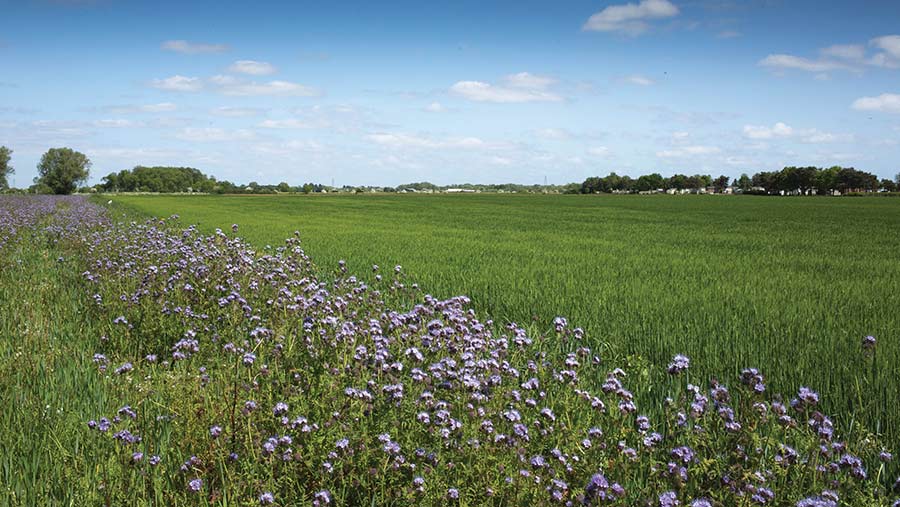SFI pilot: Farmers ‘will be paid for simply meeting the law’
 © Tim Scrivener
© Tim Scrivener Efforts to move agricultural support in a more sustainable direction appear to be faltering, say conservation groups, with farmers set to be paid for what are already regulatory requirements.
Commenting on Defra’s new Sustainable Farming Incentive (SFI) pilot scheme – details of which were released yesterday – Ellie Brodie, Wildlife Trusts head of land management, said the government appeared to be losing its environmental ambition.
“We will be looking extremely closely at the standards, but at worst it appears that some could pay for what is already included in regulation, such as watercourse buffering,” she said.
See also: Payment rates revealed for new Sustainable Farming Incentive pilot
“Paying some farmers to do what all are required to do by law, or for parts of cross-compliance, does not provide value for taxpayer money.”
Reversing wildlife loss and climate change required a fundamental shift away from conventional agriculture policy, which treats the environment as a bolt-on, towards one which sees farming and the environment as mutually dependent, she added.
Objections
Similar objections have been raised by the RSPB.
Tom Lancaster, head of land use policy, said he understood the need for the SFI to be widely available and attractive to farmers, but he also felt the pilot scheme lacked ambition.
“It is supposed to be about public money for public goods, but too much of it appears to be public money for what is already a legal requirement,” he said.
Under the new “arable land standard”, farmers involved in the pilot would receive £28/ha for, among other things, following a nutrient management plan and rapidly incorporating organic manures and slurry.
“But this is already a requirement of the Farming Rules for Water,” said Mr Lancaster.
“The basic ‘arable soils standard’ [paying £30/ha] also requires recipients to maintain minimum soil cover over winter – but again, that’s just an existing cross-compliance standard, as is the requirement for a buffer strip under the ‘hedgerow standard’.”
Mr Lancaster acknowledged the new scheme was just a pilot, and the full SFI might look different when launched next year.
“But our experience is that, if you start off too low with these schemes, it is very hard to ratchet things up later, as farmers’ expectations will have been set.”
Omissions
Food and farming alliance Sustain also felt the SFI pilot had a number of glaring omissions and could exclude some farm systems.
“Only those in receipt of the Basic Payment can apply, which will exclude several sectors,” said head of agriculture, Vicki Hird.
In particular, analysis showed that the planned SFI standards were not workable for organic farmers, and could be an issue for exclusively pasture-fed livestock.
“Agroforestry – a huge opportunity to deliver multiple on-farm benefits – is also not included,” said Ms Hird.
“The next pilots must include standards that work for organic and other agro-ecological systems.”
She also criticised the lack of any commitment to remove the 5ha minimum limit, which would exclude many smaller, productive, horticultural-type farming businesses from taking part in the pilot.
Further reaction from across the industry
“With the first cuts in BPS taking effect this year, and businesses set to lose at least 50% of their payments by 2024, the SFI will provide an essential funding bridge for many farmers and contribute to more environmental farming practices. This makes it even more important that the design and administration is well tested.”
Mark Bridgeman, president, CLA
“This first phase of the pilot only includes eight standards, so it is important that further development phases include areas such as net zero and animal health and welfare. It’s also crucial that these standards are not too prescriptive. Most importantly of all, the scheme needs to enable farmers to run profitable businesses.”
Tom Bradshaw, vice-president, NFU
“Farm support schemes have to recognise and reward what is already there rather than just pay for improvements. My hope is that the SFI will both reward existing good practice and encourage further gains, so that the sheep sector can play its part in achieving net zero, protecting our soils, water and air, and nature recovery.”
Phil Stocker, chief executive, National Sheep Association
“This is the start of the long journey moving away from area-based payments. There is still a lot of work to be done to ensure SFI becomes a robust and tangible scheme that can be practically implemented for any farming system.”
